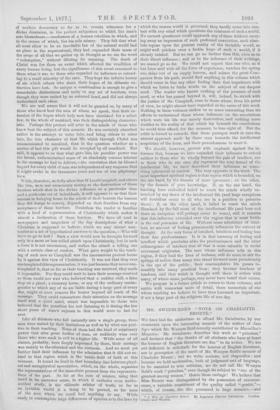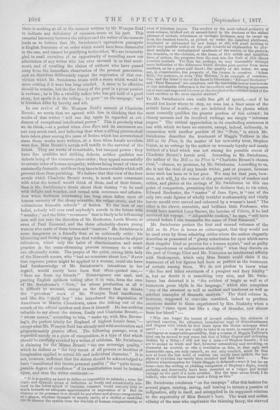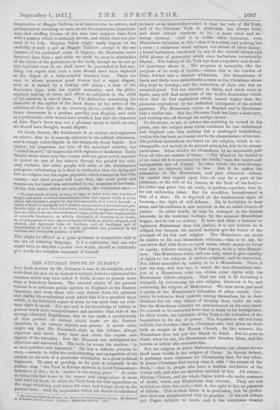SWINBURNE'S "NOTE ON CHARLOTTE BRONTE."
WE have had the misfortune to offend Mr. Swinburne, by our comments upon the interesting memoir of the author of Jane Eyre which Mr. Wemyss Reid recently contributed to Macmillan's Magazine. Mr. Swinburne describes this work as "priceless," and declares that "the thanks of all students who have at heart the honour of English literature are duo "to its writer. We are not deficient in solicitude for the honour of English literature, nor in perception of the merit of Mr. Wemyss Reid's memoir of Charlotte Brontë ; but we write reviews, not rhapsodies ; and because we hold moderation, both of judgment and of language, to be essential to true criticism, we do not call Mr. Wemyss Reid's work "priceless," even though its subject be "one of the greatest among women." Hence these ravings! We believe that Miss Bronto was distinguished by the possession of common- sense, a valuable .constituent of the quality called " genius,"— which, of course, she also possessed in large measure,—and q' A NW on Chariot( c BronCi. By Algernon Charles SwInburne, London Chatto and WIndua. there is nothing at all in the memoir written by Mr. Wemyss Reid to indicate any deficiency of common-sense on his part. This essential harmony between the subject and the writer of the memoir leads 11B to believe that Mr. Swinburne's uproarious panegyric is English literature of an order which would have been distasteful to the one, and cannot be gratifying to the other. We are invariably glad to avail ourselves of an opportunity of recording anew our admiration of any writer who has ever aroused in us that senti- ment, and of recalling the claims of authors who have passed away from the immediate observation of the present generation, and we therefore deliberately repeat the expression of that con- viction which Mr. Swinburne treats with a scorn which would be more cutting if it were less long-winded. A sneer to be effective should be concise, but the fine frenzy of the poet in a prose passion is verbose ; he is like a twaddly talker who has got hold of a good story, but spoils it in the telling ; be goes "on the rampage," and is forsaken alike by brevity and wit.
In our review of Mr. Wemyss Reid's memoir of Charlotte Bront'e, we wrote that we agreed with him in thinking that the works of that writer "will one day again be regarded as evi- dences of exceptional intellectual power." This is precisely what we do think,—at a period when Jane Eyre and its successors are not very much read, and believing that when a sifting process shall have taken place among the mass of fiction which has accumulated since those works were written, at a time when female novelists were few, Miss Bronte's novels will testify to the survival of the fittest. They are works of remarkable, but unequal power ; they have fine qualities and striking defects, neither qualities nor defects being of the common-place order ; they appeal successfully to certain sides of human sympathy, without being broad of view or suetainedly dramatic ; and thus they have in them a vitality which will prevent them from perishing. We believe that this view of the four novels which Charlotte Bronte wrote, is much more consonant with what she herself would think of them, and of their future, than is Mr. Swiuburne's tirade about their destiny "to be read with delight and wonder, and reread with reverence and admira- tion when darkness everlasting has long since fallen upon all human memory of the cheap scientific, the vulgar erotic, and the voluminous domestic schools" of fiction. To the best of our belief, nobody will ever read anybody's novels in the future with " wonder ;" and the little " reverence " that is likely to be left among men will not take the direction of Mr. Rochester, Louis Moore, or even of Paul Emanuel, and the three admirably-drawn young women who made of them heroes and "masters." Mr. Swinburne is more dangerous as a friendly than as an unfriendly critic ; his blustering and frothy eulogy has that tendency to render its object ridiculous, which only the habit of discrimination and much practice in the scum-skimming process necessary to a critic can effectually resist. The prayer of the quiet, strong little lady of the Haworth moors, who "had no nonsense about her," if ever that supreme praise might be applied to a woman, could she have had foreknowledge of Mr. Swinburne's intentions in her regard, would surely have been that often-quoted one,— " Save me from my friends !" Extravagance run mad, and panting English epithets toiling after it in vain, form the sum of Mr. Swinburne's "Note," for whose production at all it is difficult to account, except on the theory that he thinks the " priceless " work of Mr. Wemyss Reid insufficient, and like the "shrill boy" who introduced the deputation of Americans to Martin Chuzzlewit, takes the talking out of the mouth of the official speaker and does it himself. He has nothing valuable to say about the sisters, Emily and Charlotte Brontë,— "whose names," according to him, "make up, with Mrs. Brown- img's, the perfect trinity for England of highest female fame,"— except what Mr. Wemyss Reid has already said with moderation and proportionately greater effect. The following passage, even if regarded merely as a piece of composition, is a type of that which should be carefully avoided by a writer of criticism. Mr. Swinburne is claiming for the Misses Brontii "the one sovereign quality," which he defines as "the very rarest of all powers or faculties of imagination applied to actual life and individual character." It is not, however, sufficient that the sisters should be acknowledged to have "manifested this innate personal quality ;" the "quite incom- parable degree of excellence" of its manifestation must be insisted upon, and then the writer continues :— " It is a quality as hard to define as impossible to mistake • oven the static and dynamic terms of definition so freely and scientifically mis- used in the latest school of feminine romance would scarcely help us much towards an adequate apprehension or expression of it. But its absence or its presence is or should be anywhere and always recognisable at a glance, whether dynamic or merely static, of a skilful or unskilful eye to discern the systole from the diastole of human companionship, or even of inhuman jargon. The crudest as the most refined pedantry of somi-science, tricked out at second-band in the freshest or the stalest phrases of archaic schooltnen or neologie lecturers, may be swept up from the dustiest boards, or picked up under the daintiest platforms, irradiated or obfuscated by now lamps or old, will avail nothing to guide any possible seeker on the path towards an explanation by phy- goal analysis or metaphysical synthesis of the source, or tho process, the fountain, or the channel, or the issue, of this subtle and infallible force of nature, the progress from the root into the fruit of this direct creative instinct. Yet thus far, perhaps, we may reasonably attempt some indication of the difference which divides pure genius from more intellect, as by a groat gulf fixed ; the quality of the latter, we may say, is constructive, the property of the former is creative. ' Adam Bede,' for instance, or oven ' Tito Melomo,' is an example of construc- tion, and the latter is one of the finest in literature ; ' Edward Rochester' and Paul Emanuel ' are creations, and the inevitable test or touchstone of this indefinable difference is the immediate and enduring impression set at once and engraved for over on the simplest or the subtlest mind of the most careless or the most careful student."
To Mr. Swinburne's own really fine gift of speech,—and if he would but know where to stop, no man has a finer sense of the artistic force of words,—we are indebted for the phrase which most correctly qualifies the greater portion of this extract ; its clumsy sarcasm and its involved verbiage are simply "inhuman jargon." The critical appreciation in its concluding sentences is one with which we have no concern, except, indeed, indirectly, in connection with another portion of the "Note," in which Mr. Swinburne describes the treatment of Maggie Tulliver in the
Mill on the Floss, in the matter of her unworthy lover, Stephen Guest, as an outrage by the author on womanly loyalty and manly instinct of a kind which was not among the possible errors of Charlotte Bronte's heroic soul. According to Mr. Swinburne, the author of the Mill on the Floss is "Charlotte Brontii's chosen rival,"—chosen, we presume, by Mr. Swinburne. According to us, she is not the rival of any female writer, past or present, because
none such has been or is her peer. We may let that pass, how- ever, as it will, by the voices of the great majority of readers and
critics, and glance at the ravings of Mr. Swinburne on this one point of comparison, premising that he declares that, to his mind, Edward Rochester, the "master" of Jane Eyre, is "one of the only two male figures of wholly truthful workmanship and vitally heroic mould ever carved and coloured by a woman's hand." The other is the clever, eccentric, and brilliant little Professor, who would have married Lucy Snowe, the heroine of Villette, if he had survived his voyage. " All possible readers," he says, "will have uttered before I can transcribe the name of Paul Emanuel."
Mr. Swinburne praises the first and second volumes of the Mill on the Floss in terms so extravagant, that they would not be used even by those admiring critics whom the author elegantly describes as possessed of "glassy substitutes for eyes which serve
their singular kind as proxies for a human squint," and as guilty of "superhuman or subsimioua absurdity" when they discern on the part of George Eliot and Mr. Tennyson an intellectual affinity with Shakespeare, which only Miss Brontë could claim if the treatment of all her figures had been as perfect as the treatment of certain among them. We do not profess to know what "the fine and bitter sweetness of a pungent and fiery fidelity" is, but no doubt it is something very nice, and Mr. Swin- burne has detected it in "the noblest of tragic as well as of humorous prose idylls in the language," which also comprises "one of the sweetest as well as saddest and tenderest as well as subtlest examples of dratnatie analysis." The third volume is, however, supposed to convulse mankind, indeed to produce
emotions similar to those experienced by Mrs. Nickleby when a surprise "came upon her like a clap of thunder, and almost froze her blood " :—
" Who can forget the horror of inward collapse the sickness of spiritual reaction, the reluctant, incredulous rage Of disenchantment and disgust with which he first came upon the thrice unhappy third
part? If we are really to take it on trust, to confront it as a contingent or conceivable possibility, that a woman of Maggie Tulliver's kind can be moved to any sense but that of bitter disgust and sickening disdain by a thing—I will not say a man—of Stephen Guest's ; if we arc to accept as truth and fact, however astonishing and revolting, so shameful an avowal, so vile a revelation as this, in that ugly and lamentable ease, our only remark, as our only comfort, must be that now at least the last word of realism has surely been spoken, the last abyss of cynicism has surely boon sounded and laid hare The hideous transformation by which Maggie is debased—were it but for an hour—into the willing or yielding companion of Stephen's flight, would probably and, deservedly have been resented as a vulgar and. brutal outrage on the part of a male novelist. But the man never lived, I do believe, who could have done sub a thing as this."
Mr. Swinburne continues "on the rampage" after this fashion for several pages, ranting, raving, and tearing to tatters a passion of indignation, silly in itself, and misapplied in its supposed relation to the superiority of Miss Brontifs hero. The weak and selfish villainy of the man who captivates the thirsting fancy, the starved
imagination of Maggie Tulliver, is at least as true to nature, and perhaps not so revolting to taste, as are the coarseness, imperious- ness, and scoffing licence of the man who inspires Jane Eyre with a passion which is certainly slavish, and which does not pre- tend to be holy. Stephen Guest might easily impose on the credulity of such a girl as Maggie Tulliver ; except in the one instance of his meditated crime of bigamy, Mr. Rochester never deceived Jane Eyre ; and while we yield to none in admiration of the talent of the portraiture in the book, though we do not go into hysterics over it, we shall never he persuaded to feel any- thing but regret that such a man should have been depicted as the object of a lofty-minded woman's love. There are men in whose presence good women feel a vague disgust, such as is caused by a lurking evil odour ; a man of the Rochester type, with his cynical memories, and his philo- sophical tracing of cause and effect as exhibited in the child of his mistress, is one of them. The deduction concerning the character of the author of the book drawn by the writer of the criticism of Jane Byre in the Quarterly Review (which Mr, S win- burne denounces in a profane parody) was illogical, and such as a profounder critic would have avoided, but that the character of Jane Eyre's lover was not a pleasant study in itself, no one, we should have thought, would dispute.
Of Emily Brontb, Mr. Swinburne is BO violent and rapturous an adorer, that he is scarcely coherent in his mildest utterances, and is simply unintelligible in his designedly finest flights. Her poetry, her paganism, her love of the moorland country, her " chainless soul," all inspire him with raptures of laudation. Emily Bront6 wrote some very fine verses, and one great novel, superior in power to any of her sister's, though too painful for ordi- nary readers ; but sober people will smile at Mr. Swinburne's paneg,yrie, culminating as it does in exultation that the dying girl had no religion but the vague paganism which transports him with exstasy ; and kind people will hope that, like most poets and romancers, her heart was untroubled by the creations of her brain. Of her last verses, which are true poetry, Mr. Swinburne says :— " No last words of poet, or hero, or sago, or saint were ever worthy of longer and more reverent remembrance than that appeal which is so far above and beyond a prayer to the indestructible God within herself ; a psalm of trust so strangely (as it seems) compounded of personal and pan- theistic faith, at once fiery and solemn, full alike of resignation and of rap- ture, far alike from the conventions of vulgar piety and tbe complacencies of scientific limitation ; as utterly disdainful of doctrine as of doubt, as contemptuous of hear-say as reverent of itself, as wholly stripped, and cleared, and lightened from all burdens, and all bandages' and all incrustations of creed as it is utterly pervaded and possessed by the sublime and irrefutable passion of belief," This might be offered as a prize specimen of competitive skill in the art of misusing language. It is a misfortune that one who might have so singular a power over words, should so habitually give words the complete command of himself.
































 Previous page
Previous page